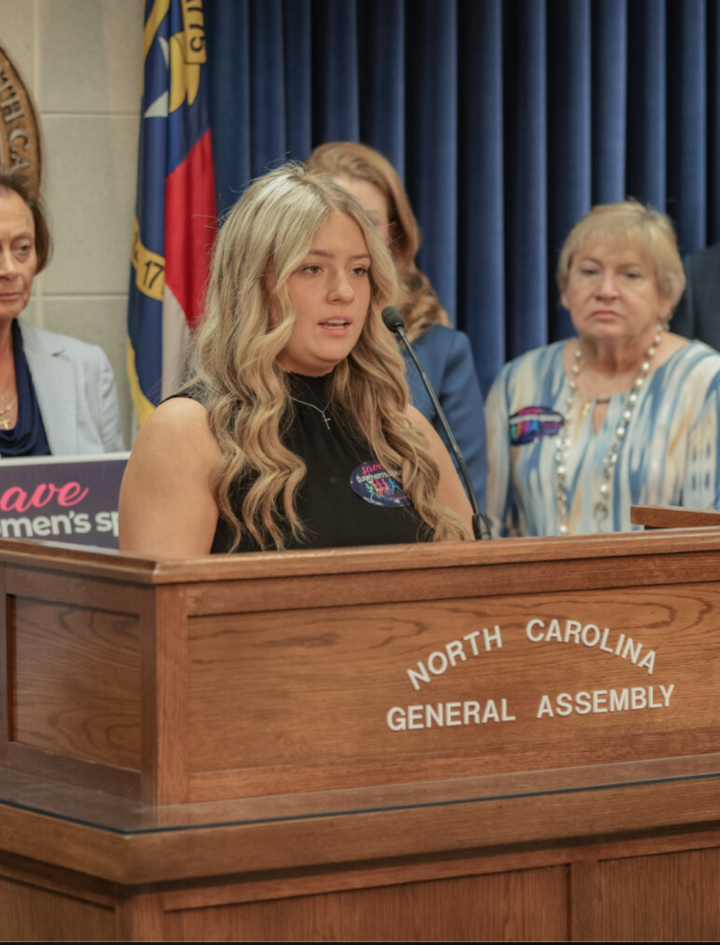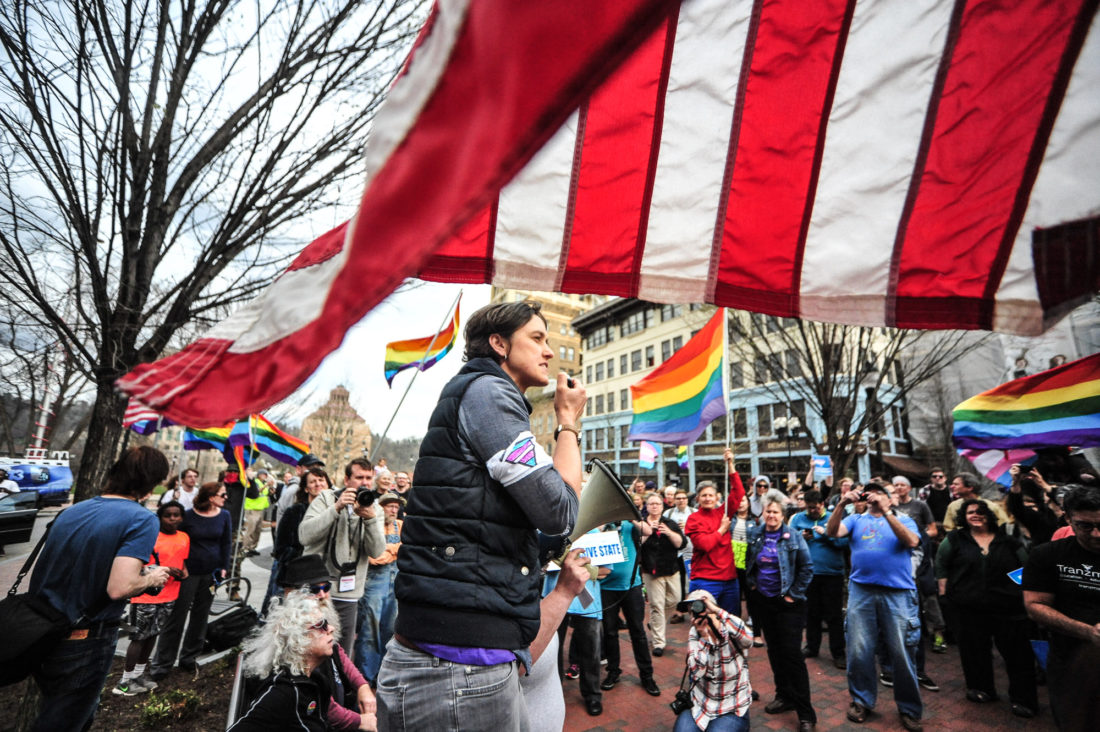North Carolina is on the brink of banning transgender athletes in women’s school sports from middle school through college.
HB 574, also known as the Fairness in Women’s Sports Act, requires a student’s sex to be recognized solely based on reproductive biology for the purposes of athletic participation. Additionally, the act has a provision that allows students who “are deprived of an athletic opportunity” to file suit if they feel a transgender student violates the law.
Gov. Roy Cooper vetoed the bill July 5, but the legislature’s Republican supermajority is expected to override the veto.
William Hoke, the athletic director and head coach for girls basketball, coed tennis and coed golf at Cane Creek Middle School in Fletcher, said that he doesn’t know how the bill would work at the middle school level. He says it raises the risk of transgender students enduring more bullying if they are being forced to play for a team whose gender they don’t identify with.
“You’re basically telling these kids that because they’re different, they aren’t allowed to play a sport,” Hoke says. “Sports should be one of the things that brings these kids to school and keeps them there.”
Other athletic directors and coaches throughout the Buncombe County Schools district and Asheville City Schools were contacted but did not respond to requests for comment.
New political tides
If the veto is overridden and the law is passed, immediate restrictions will be put into place in all public and private schools. State Sen. Julie Mayfield, D-Buncombe, questioned the implementation of the proposed law, particularly at the college level.
“I don’t see how this law is really enforceable,” says Mayfield. “If a college participates in the NCAA, and the NCAA has its own policies, as I think they do on this issue for different kinds of sports, what we’re saying is that this trumps our colleges’ and universities’ participation in NCAA sports over the NCAA policy. That doesn’t make sense.”
The N.C. High School Athletic Association adopted a policy in 2019 that allowed transgender students to compete in high school sports as the gender with which they identify. Since then, 18 students statewide submitted gender-identity request forms to be evaluated by a committee, and 16 were approved. Of those 16, two were transgender girls.
Two years ago, a similar ban bill was filed, but Republican legislative leaders backed off after strong opposition from the public, dismissing the issue as a solution in search of a problem. But Republicans revisited the issue once it gained a supermajority this summer when Rep. Tricia Cotham, R-Mecklenburg, switched parties from Democratic to Republican.
Mixed reactions
Several LGBTQ+ advocacy groups have expressed their distaste for the bill, calling it discriminatory and divisive. Asheville-based nonprofit Campaign for Southern Equality announced July 5 that families of trans youths in North Carolina can apply for support from the Southern Trans Youth Emergency Project, which provides emergency grants to families of trans youths, specifically regarding mental health services and gender-affirming care. Jasmine Beach-Ferrara, a Buncombe County commissioner and the group’s executive director, says the organization expects the veto to be overridden.
“Even as we will advocate tirelessly for the North Carolina General Assembly to do the right thing by sustaining Gov. Cooper’s veto, we remain clear-eyed that families should take steps to prepare if anti-LGBTQ+ legislation is enacted,” says Beach-Ferrara.
Conversely, several conservative activist groups, such as the Independent Women’s Forum, have praised the bill as a step to protect female athletes. In a press release, Virginia-based IWF said states should not sacrifice female athletes in the name of being more inclusive.
“As more and more biological males enter women’s sports, the threat to female athletes is growing. Allowing males to play women’s sports is unfair because of the incontrovertible male athletic advantage, and allowing a single male to play on a competitive women’s team takes opportunities from female athletes,” the release says.
Rachel McCanely, an Asheville resident and IWF supporter, said on the social media platform Reddit that she thinks the bill is an important step to protect young female athletes.
“I have two young girls of my own that play soccer, and to think that they could get hurt by some male athlete that is stronger than them is terrifying,” McCanely told Xpress. “It also bothers me to think my girls may lose opportunities or awards. That is not OK.”
What’s it like to be trans
Jaime, who requested her last name be omitted due to safety concerns, is a 17-year-old transgender high school senior raised in Asheville who has spent most of her life trying to fit in and belong. She said that she felt like a girl her whole life but didn’t know how to express it as a younger child.
“Until I was about 5 or 6, I didn’t really think about the fact that I wasn’t a girl,” Jaime says. “One of my earliest memories is of me being yelled at by a teacher for going to the bathroom with the girls instead of the boys.”
Jamie transitioned when she was 12 and has been taking a testosterone hormone suppressant since she was 16. While her parents have supported her transition, her fellow students and teammates have been less accepting.
“School has always been extremely difficult because I get bullied a lot,” Jaime says. “I get picked on for being too thin, for being feminine, for not liking football, for hanging round with girls, for having long hair. They mocked everything they could think of in terms of gender and sexuality.”
Throughout middle school and high school, Jaime competed on male cross-country teams. However, now that she has been taking hormone suppressants and looks more feminine, she was considering petitioning to run for the women’s team.
“I love cross-country, but I always hated team practices [with the boys’ team],” Jaime says. “The guys on the team would constantly take their shirts off for practice and then pick on me for leaving mine on. I always wanted to try to compete with the other girls, but I was worried that I would make them uncomfortable, which is never something I wanted to do. I waited until I had gone through hormone therapy for a while so that I looked more feminine before asking the girls coach if I could try out for the team.”
The coach of the women’s team was very supportive of Jaime switching teams and encouraged her to petition the NCHSA. When she heard about the potential North Carolina legislation banning transgender athletes, Jaime was devastated. After a long conversation with her parents and the cross-country coaches at her high school, she decided it was not worth the backlash and struggle that she would endure to continue running for either team. She withdrew her petition.
“I was really depressed when I heard about the new law because I knew it would go through and that I would never get to run on a team where I felt like I belonged. I was so close, and it was all taken away from me.”
“Women have been historically oppressed, especially when it comes to sports,” Jaime says. “I understand the concern that a lot of girls have about transgender athletes competing, but I think people need to realize that none of us are trying to steal scholarships or awards from girls. For most of us, sports is just an outlet to get through the challenges of being trans in high school, and now it is being taken away from us. The new law isn’t pro-woman at all; it is just anti-trans.”
“A lot of people think that trans people just wake up one day and decide to be trans,” Jaime says. “It is not like that at all. Nothing has happened in my life to make me trans. I was born trans, and it’s not right that I am constantly being punished for it. It isn’t fair at all.”
WCU student supports law
Payton McNabb, former high school volleyball player and current student at Western Carolina University, has been a strong supporter of the Fairness in Women’s Sports Act. She was injured by a transgender athlete during a game in September 2022. A transgender girl spiked a ball at McNabb’s face, causing her to suffer a concussion and neck injury.
“I remember the silence and shock in the gym after I got hit and the fear that I saw on my teammates’ faces knowing that they would have to continue the game after it happened,” McNabb says. “It was very traumatizing, and the recovery has been really difficult.”
In testimony before a state Senate committee, McNabb blamed the NCHSAA’s inclusion policy for her injury and discussed the lingering effects of her concussion.

“Due to the North Carolina High School Athletic Association policy allowing biological males to compete against biological females, my life has forever been changed,” McNabb said. She said that she still struggles with the effects of her injuries, including impaired vision, partial paralysis on the right side of her body, unremitting headaches, anxiety and depression. She added her academic performance has been harmed and she now needs accommodations at school for testing. However, McNabb said that her own injuries are not as important to her as protecting female athletes in the future.
“I could go on and on about how this has affected my life, but that is not what I spoke about at the Capitol,” McNabb says. “I went for every biological female athlete behind me. I may have been the first to be injured, but if this law doesn’t pass, I won’t be the last.”
McNabb said that she believes that the law is not intended to be discriminatory but rather a safety measure for young women athletes.
“Sports should be a safe space for girls, not one where they worry if they are going to make it through a game healthily,” McNabb says.
Dr. CK Raynes Wilder, an Asheville-based family physician, testified before a state Senate committee. She told the panel that excluding transgender women wouldn’t protect cisgender athletes from injury but instead would further isolate a small population of students already at risk of bullying and mental health challenges. Furthermore, Wilder noted in her testimony that the argument that transgender athletes competing would decrease female participation in sports was ill supported.
“There is no actual evidence to support the claim that allowing transgender athletes to participate will reduce or harm participation in girls sports,” Wilder said. “On the other hand, there is strong evidence that sports participation is an important childhood experience for all children.”
Should the law take effect, North Carolina will be among 22 states that ban transgender athletes. Several organizations, including the Human Rights Campaign and the National Center for Transgender Equality, have already vowed to take legal action against the state if the bill is made law. The state legislature has until Aug. 31, the end of its legislative session, to override the governor’s veto.




Cry me a river. William Hoke states, “You’re basically telling these kids that because they’re different, they aren’t allowed to play a sport”. I don’t believe anybody is telling them that. They are being told to participate in the program for the sex they were born and will always be. Why this minuscule group gets the attention it does is beyond me.